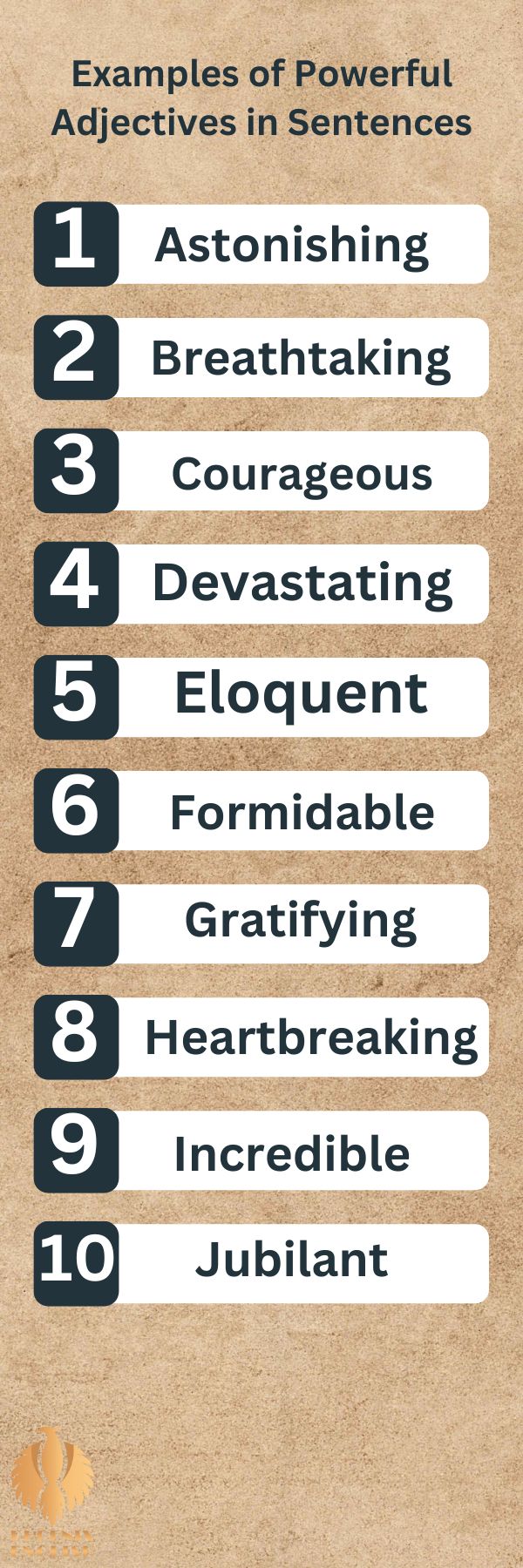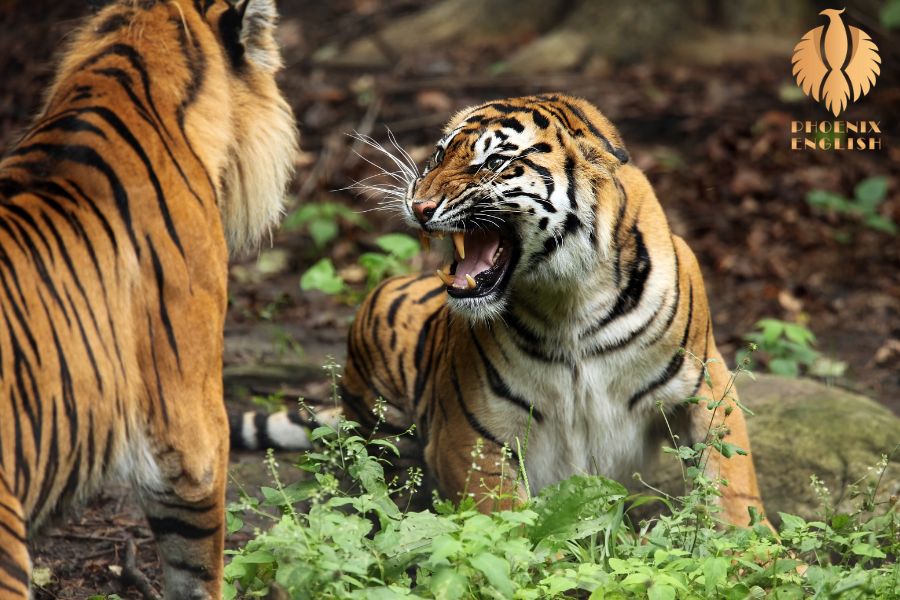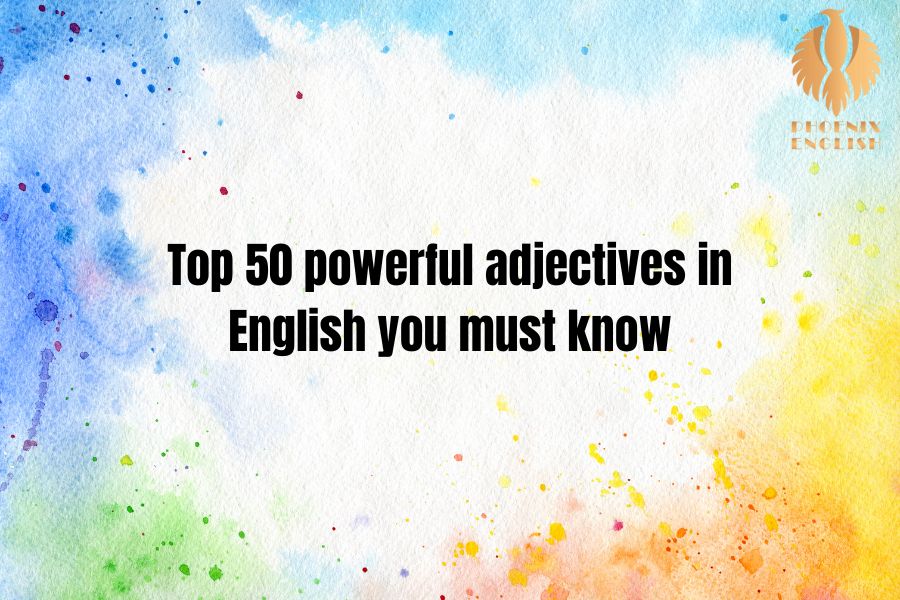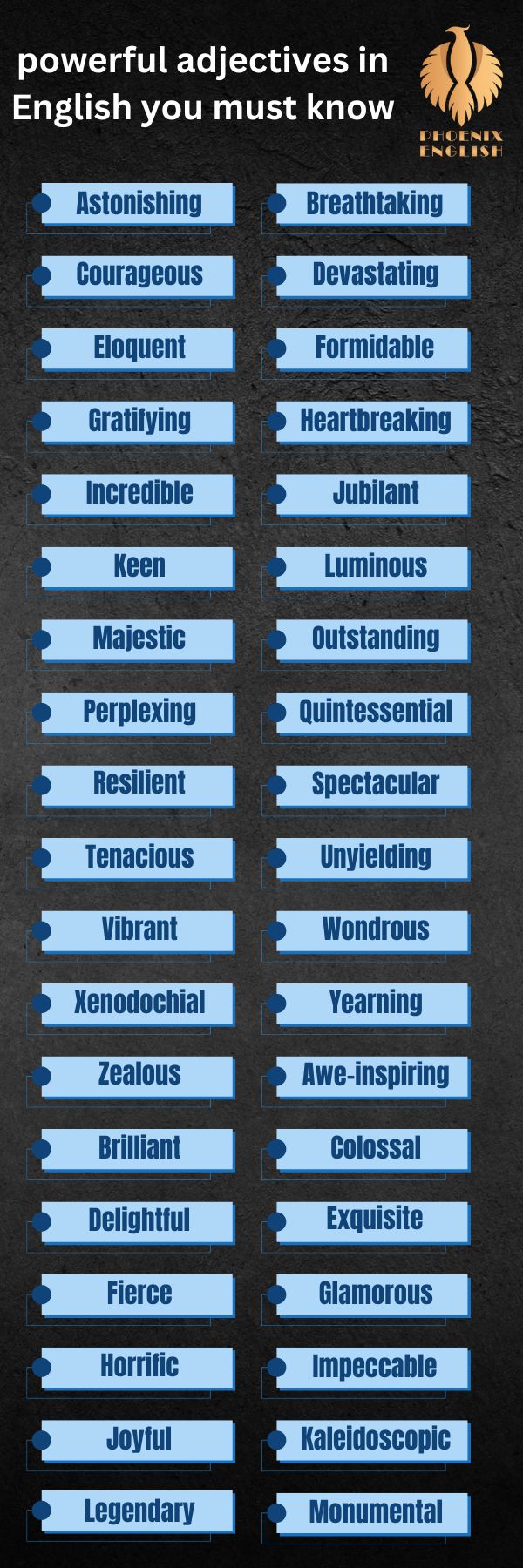Adjectives are vital parts of language that give my writing clarity, depth, and color. They assist me in elaborating on the characteristics of nouns, which enhances the vividness and interest of my phrases.
There is a wide variety of adjectives in the English language, yet some are more powerful and impactful than others. In addition to improving my descriptions, these potent adjectives arouse intense feelings and leave a lasting impression.
I look at the top 50 English adjectives that are strong enough to know here.
You might also enjoy: Top 100 Commonly Used Verbs That Start With M [2024]
Top 50 Powerful Adjectives In English You Must Know
1. Astonishing
An adjective that conveys a sense of amazement and surprise, often used to describe something that is unexpectedly impressive or extraordinary. For example, The magician‘s performance was astonishing.
2. Breathtaking
This adjective describes something so beautiful or remarkable that it takes my breath away. It‘s often used for natural sceneries, art, or performances. The view from the sea is breathtaking.
3. Courageous
A powerful adjective to describe someone who shows bravery and is willing to confront fear or danger. The firefighters were courageous in their efforts to save lives.
4. Devastating
Used to describe something that causes severe shock, distress, or damage. The earthquake had a devastating impact on the buildings and people.
5. Eloquent
Describes someone who is fluent and persuasive in speaking or writing, often in a graceful or moving way. Dina‘s speech at the meeting was eloquent.
6. Formidable
This adjective characterizes something or someone that inspires fear or respect due to being impressively large, powerful, or capable. The opposing team was formidable, but we were determined to win.
7. Gratifying
used to characterize pleasurable or satisfying things. Winning the award was a gratifying experience.
8. Heartbreaking
Describes something that causes extreme sadness or sorrow. The story of the dying princess was heartbreaking.
9. Incredible
An adjective that conveys a sense of disbelief due to being extraordinary or hard to believe. The acrobat‘s stunts were incredible.
10. Jubilant

Describes a feeling of great happiness and triumph. The man was jubilant after winning the match.
11. Keen
Indicates a sharp, penetrating, or enthusiastic quality, often used to describe senses, intellect, or interest. The teacher has a keen eye for novels.
12. Luminous
Used to describe something that is bright or shining, often metaphorically to describe someone who is radiant or inspiring. Her luminous smile brightened the room.
13. Majestic
An adjective that conveys grandeur, dignity, and beauty, often used for landscapes, buildings, or people. The majestic mountains towered over the valley.
14. Noteworthy
Describes something deserving attention or recognition due to its importance or excellence. Her contributions to the project were noteworthy.
15. Outstanding
Used to describe something that stands out due to being exceptionally good or impressive. His performance was outstanding.
16. Perplexing
This adjective is used to describe something confusing or difficult to understand. The mystery novel had a perplexing plot.
17. Quintessential
Describes something that is the perfect example of a particular quality or class. She is the quintessential professional.
18. Resilient
Used to describe someone or something that can withstand or recover quickly from difficult conditions. The woman showed a resilient spirit after loosing her child.
19. Spectacular
An adjective used to describe something that is dramatically impressive. The fireworks display was spectacular.
20. Tenacious
Describes someone who is very determined and persistent. Maria‘s is so tenacious. She passed the tests successfully.
21. Unyielding
This adjective describes someone or something that does not give way to pressure, firmly fixed or determined. He had an unyielding commitment to justice.
22. Vibrant
Used to describe something full of energy and enthusiasm. The festival was a vibrant celebration of culture.
23. Wondrous
An adjective that conveys a sense of wonder and amazement. The ancient ruins were a wondrous sight.
24. Xenodochial
A lesser-known adjective that describes someone who is friendly to strangers or foreigners. The villagers were xenodochia and welcoming.
25. Yearning
Describes a feeling of intense longing or desire. He felt a yearning to return to his homeland.
26. Zealous
Used to describe someone who is fervent and passionately devoted to a cause. The volunteers were zealous in their efforts to help the community.
27. Awe-inspiring
This adjective describes something that arouses awe through being impressive or formidable. The ancient temple was awe-inspiring.
28. Brilliant
Used to describe something exceptionally clever or talented, often also meaning very bright. Her solution to the problem was brilliant.
29. Colossal
Describes something extremely large or great. The skyscraper was a colossal structure.
30. Delightful
An adjective that conveys a sense of great pleasure or enjoyment. The garden party was delightful.
31. Exquisite
Used to describe something extremely beautiful and delicate. The pianist played an exquisite piece.
32. Fierce
This adjective describes something intense, aggressive, or powerful. The competition was fierce.
33. Glamorous
Describes something attractive in an exciting and special way. The movie star‘s life seemed glamorous.
34. Horrific
An adjective that describes something causing horror or shock. The accident was a horrific event.
35. Impeccable
Used to describe something flawless or perfect. Her manners were impeccable.
36. Joyful
An adjective that conveys a sense of great happiness and pleasure. The baby was joyful to see other babies.
37. Kaleidoscopic
Describes something that is constantly changing, especially in a way that is interesting or visually appealing. The leaves on the ground were a kaleidoscopic display of colors.
38. Legendary
This adjective is used to describe something very famous and well-known, often due to remarkable qualities. The singer‘s performances were legendary.
39. Monumental
Describes something of great importance or size, often used for significant achievements or structures. The construction of the theatre was a monumental task many people had been waiting for.
40. Noble

Used to describe someone with fine personal qualities or high moral principles. He was a noble leader, respected by all.
41. Overwhelming
An adjective that conveys a strong emotional impact or an immense amount of something. The support from the community was overwhelming.
42. Prodigious
describes something that is extraordinarily large, amazing, or profound. The scientist made prodigious discoveries.
43. Radiant
Used to describe something that emits light or heat, often used metaphorically to describe someone who is visibly happy or beautiful. The young lady looked radiant on her proposal day.
44. Sublime
An adjective that describes something of such excellence, grandeur, or beauty as to inspire great admiration or awe. The symphony was a sublime musical experience.
45. Tremendous
Describes something very great in amount, scale, or intensity. The team made tremendous progress.
You might also enjoy: Top 100 Commonly Used Verbs That Start With D [2024]
46. Unparalleled
Used to describe something that has no equal; unmatched in quality or significance. Her expertise in the field was unparalleled.
47. Valiant
An adjective that describes someone who shows courage or determination. The soldiers were valiant in battle.
48. Whimsical
Describes something playful or fanciful, especially in an appealing and amusing way. The artist‘s work was full of whimsical charm.
49. Youthful

Used to describe someone who has the qualities of youth, such as energy, enthusiasm, and freshness. Her youthful spirit was contagious.
50. Zesty
An adjective that conveys a sense of lively excitement and enthusiasm. The salsa had a zesty flavor.
These powerful adjectives enhance my language, allowing me to express nuances and emotions with greater clarity and impact.
Whether I‘m writing a novel, giving a speech, or simply describing my day, incorporating these adjectives can make my communication more compelling and vivid.
Understanding and using these powerful adjectives will not only improve my vocabulary but also make my expressions more dynamic and engaging.
The Importance of Powerful Adjectives
In order to communicate effectively, adjectives are essential. They give me detailed knowledge on nouns, which helps me to paint vivid and accurate pictures for my readers or listeners. Strong adjectives in particular give my descriptions more depth and impact. They have the power to make even the most basic sentence lively and unforgettable.
For instance, compare the following sentences:
1. The view was beautiful.
2. The view was breathtaking.
While both sentences convey a positive impression of the view, the second sentence, using the powerful adjective breathtaking, evokes a much stronger emotional response. It suggests that the view is not just pleasing but overwhelmingly beautiful.
Enhancing My Writing with Powerful Adjectives
Incorporating powerful adjectives into my writing can elevate it from ordinary to extraordinary. Here are a few tips on how to effectively use these adjectives:
1. Be Specific:
Choose adjectives that precisely describe the qualities I want to convey. Instead of saying good, I might opt for excellent or outstanding depending on the context.
2. Avoid Overuse:
While powerful adjectives can enhance my writing, using too many can make my prose feel overwrought or melodramatic. I aim for balance and use them strategically to emphasize key points.
3. Match the Tone:
I ensure that the adjectives I use match the tone and context of my writing. For example, whimsical might be perfect for a children's story but out of place in a formal business report.
4. Show, Don’t Just Tell:
I use powerful adjectives to show rather than tell. Instead of saying She was sad, I might say, Her heart was heavy with sorrow, which provides a more vivid and emotional image.
5. Vary My Vocabulary:
I avoid repetition by using a variety of powerful adjectives. This not only keeps my writing interesting but also expands my vocabulary.
Examples of Powerful Adjectives in Sentences

To illustrate the impact of powerful adjectives, let’s look at some examples in sentences:
1. Astonishing:
The scientist made an astonishing breakthrough in the treatment of cancer.
2. Breathtaking:
The artist’s depiction of the sunset was simply breathtaking.
3. Courageous:
The rescue workers showed courageous determination in the face of danger.
4. Devastating:
The news of the natural disaster was devastating to the small community.
5. Eloquent:
The author’s eloquent writing captured the hearts of readers worldwide.
6. Formidable:
The castle’s formidable walls stood tall against the invaders.
7. Gratifying:
Seeing her students succeed was a gratifying experience for the teacher.
8. Heartbreaking:
The film’s ending was heartbreaking and left the audience in tears.
9. Incredible:
The dancer’s performance was incredible, leaving the judges speechless.
10. Jubilant:

The crowd was jubilant after the home team won the championship.
The Psychological Impact of Powerful Adjectives
Strong adjectives elicit feelings and build connections in addition to describing. By characterizing a scenario as devastating instead of just bad, I create a more profound emotional response from my audience.
In ordinary communication as well as persuasive writing and narrative, emotional engagement is essential.
Expanding My Vocabulary
To become proficient in using powerful adjectives, it’s essential to expand my vocabulary continually. Here are some strategies to help me do this:
1. Read Widely:
Exposure to diverse genres and authors will introduce me to a wide range of adjectives and stylistic approaches.
2. Use a Thesaurus:
When writing, a thesaurus can help me find the perfect adjective for my needs. However, I ensure I understand the nuances of each word to use it correctly.
3. Practice Writing:
Regular writing practice helps reinforce my vocabulary and allows me to experiment with different adjectives.
You might also enjoy: Top 100 Commonly Used Verbs That Start With B [2024]
4. Learn from Feedback:
I pay attention to feedback on my writing. Others might suggest more powerful adjectives or highlight areas where my descriptions could be more vivid.
5. Engage in Word Games:
Games like Scrabble, crosswords, and word searches can be fun ways to improve my vocabulary.
Additional Examples and Contexts
To further illustrate the versatility and impact of powerful adjectives, let’s explore additional contexts and examples:
1. Awe-inspiring:
The Grand Canyon is an awe-inspiring natural wonder.
2. Brilliant:
His brilliant solution to the complex problem was highly praised.
3. Colossal:
The colossal statue stood as a testament to the ancient civilization’s
craftsmanship.
4. Delightful:
The children’s laughter was a delightful sound that filled the air.
5. Exquisite:
The chef’s exquisite dish was a feast for the senses.
6. Fierce:

The debate was fierce, with both sides presenting compelling arguments.
7. Glamorous:
The actress’s glamorous appearance on the red carpet captivated the media.
8. Horrific:
The eyewitness account of the war was horrific and deeply moving.
9. Impeccable:
The hotel’s service was impeccable, ensuring a perfect stay.
10. Joyful:
The festival was a joyful celebration of culture and community.
Exploring Adjectives Through Literature
Literature is a rich source of powerful adjectives, and studying the works of great authors can provide insights into effective usage. For instance, Charles Dickens’ Bleak House is known for its vivid descriptions, while the poetic works of William Wordsworth are filled with evocative adjectives that bring nature to life.
Consider this passage from Bleak House Fog everywhere.
Fog up the river, where it flows among green aits and meadows; fog down the river, where it rolls defiled among the tiers of shipping and the waterside pollution of a great (and dirty) city.
Dickens’ use of adjectives like defiled and great (and dirty) creates a strong visual and emotional impact, painting a vivid picture of the scene.
Powerful Adjectives in Modern Media

In modern media, powerful adjectives are used to grab attention and evoke emotions quickly. Headlines, advertisements, and social media posts often rely on strong adjectives to make an impact. For example:
● Headline: Devastating Wildfire Destroys Thousands of Homes
● Advertisement: Experience the Exquisite Comfort of Our New Mattresses
● Social Media Post: Feeling Jubilant after Completing All My University Exams!
These examples show how powerful adjectives can enhance communication and make messages more engaging and memorable.
Conclusion
Adjectives give my descriptions more depth and flavor; they are the spice of language. Strong adjectives are distinguished from the rest by their capacity to arouse intense feelings and conjure up vivid imagery.
I may improve the precision, impact, and engagement of my communication by adding these top 50 powerful adjectives to my repertoire.
I keep in mind to balance the usage of strong adjectives with the tone and context of my work. It‘s crucial that I increase my vocabulary through reading, practicing, and getting feedback.
Whether I‘m writing a persuasive essay, a gripping story, or just summarizing my day, using strong adjectives will improve my ability to communicate and have an impact on the people I‘m writing for.

Hi, welcome to my blog! My name is Omid and I am thrilled to have you here! I am an English language teacher with 12 years of experience and hold multiple international certifications (TESOL, IELTS, TOEFL, PTE, CELTA). Additionally, I hold a PhD in Applied Linguistics with a specialization in Teaching English as a Second Language (TESL), which fuels my passion for teaching English and assisting others in mastering the language. To me, nothing is more rewarding than helping individuals enhance their English language abilities through various methods. So, let’s embark on this journey of learning English together.





